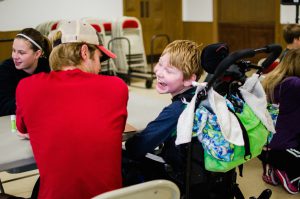 Winona State University has partnered with the Winona Family YMCA and Winona-area families to promote a powerful idea: physical activity is not limited by ability.
Winona State University has partnered with the Winona Family YMCA and Winona-area families to promote a powerful idea: physical activity is not limited by ability.
The program began as a response to public focus groups in Winona that indicated a desire for more family programming, including physical activity, for children with disabilities.
Students in Professor Manny Felix’s Adapted Physical Education Teaching Minor spend time each semester at the YMCA as part of the Physical Activity for Life, Learning and Love program (PALs), creating and assisting in activities for children with disabilities in pre-Kindergarten through middle school. Depending on student abilities, physical activities may address the development of health-related physical fitness, fundamental motor skills, body management, and wheelchair sports. Emphasis includes positive social interaction and behavior.
WSU physical education students gain experience with special education processes by assessing current abilities, determining appropriate goals, creating relevant and unique lesson activities, and monitoring progress, according to Felix. PALs provides win-win opportunities for all involved. PALs participants receive appropriate individualized and group physical activity instruction in a community setting while WSU physical education teaching majors gain experience in teaching students with disabilities through hands-on experiences.
“We’re going to teach them functional physical activity skills they can use in life to increase their physical activity levels and enhance their health,” Felix said. “We want to have our future teachers teach those students useful physical activity skills they can use in their own communities.”
According to Felix, completion of the program fulfills part of a requirement for students in WSU’s Adapted Physical Education Teaching Minor. But according to the students, it does more than complete a goal they need to earn a degree.
“I loved working with the students at the YMCA. It was wonderful to see them recognize us each week and come in with a smile because they knew we would all have fun,” said Health and Physical Education student Ali Johnston. “I enjoyed seeing the students laugh and grow, and every one of them progressed towards their goals for the semester. “
Johnston said working with the students also gave her a new perspective into patience and being flexible.
Health Education student David Tichy agreed, adding that it is often the teacher who needs to adapt to his students, something he gleaned from working with the PALs program.
“You have to be able to modify your lesson to the students that you are teaching, otherwise the students may not be able to grasp the content you are trying to teach,” Tichy said. “You also have to be patient with your students because they may not get it right away, so you’ll have to be willing to continue working with the students on the content and not just move on.”
Physical and health education student Connolly Turek said he was initially nervous about having to modify the plans he created, but his students taught him a little bit about resiliency.
“I was really worried about modifying the lesson to fit the needs of the students,” Turek said. “However, if they can physically do it, even if it’s difficult, the students want to try.”
According to Felix, the PALs program is continuing to grow. In spring 2017, the students will also be working with the young students in the Winona Family YMCA aquatic center, and broadening their learning objectives.
For more information, contact University Communications at 507-457-5024.
